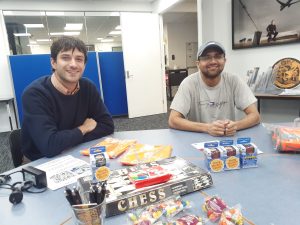Safe space created for Melbourne’s gig workers
They are the forgotten people of cities around the world – gig workers and delivery drivers who go about their difficult and often dangerous jobs with little recognition or thanks.
But an Australia-first initiative is providing a safe space where gig workers can find respite in the heart of Melbourne.
The ‘Gig Workers Hub’, based at the Melbourne Multicultural Hub, is a place where riders, drivers and cleaners can come together to meet one another and feel supported.
The hub’s volunteers provide free access to food and drinks, relevant information, phone chargers, and other amenities.
 Delivery and rideshare platforms have reshaped life in Melbourne, but until recently there have been no spaces designed for gig workers themselves.
Delivery and rideshare platforms have reshaped life in Melbourne, but until recently there have been no spaces designed for gig workers themselves.
Founded by a group of volunteers, the hub is being supported by migrant and refugee agency AMES Australia and the City of Melbourne.
The driving force behind the hub is Andrew Copolov, a former delivery driver and now an Architecture PhD student.
“Gig workers are largely unseen and unappreciated. You are barely conscious that there is a human being performing the role,” Andrew said.
“And there is widespread abuse and underpayment. Ninety per cent of these delivery drivers are migrants and this migrant community faces a variety of challenges.
“One of the biggest challenges is finding stable employment. Another is how exposed they are to danger and abuse. They also have little access to basic amenities.
“Also, people almost think of them as an extension of the delivery platform they are working for, which is dehumanising.
“The hub helps new migrants by providing a safe space. It’s effectively a first port of call for people who may have been here just a matter of weeks.
“There are immediately useful thinks like free drinks and snacks. But we also have things gear – water bottles and lights,” Andrew said.
The hub also provides information on a variety of topics such a visas and work rights.
“We can’t and don’t do everything. For instance, we can’t immediately help with getting better pay but the space does lend a bit of dignity,” Andrew said.
“Gig workers deserve dignity, and they deserve respect and it’s on all of us to help them achieve that.
“To the gig workers, I would say here’s a space that is yours. Come here and enjoy it and meet other people,” he said.
Andrew said the gig worker hub is part of his PhD research project, which also encompassed working for a time as a delivery driver.
“I’m interested in logistics and in people who move things around; people like delivery riders and share ride drivers and how urban space and architecture can help them.
“We think facilities like the hub can provide dignity, amenity and combat isolation,” he said.
The gig worker hub is part of an emerging international movement with similar facilities in New York, Vienna, Brussels, Bordeaux, and Jakarta.
“We are trying to build and international network and share out learnings and experiences. The goal is to see spaces like this distributed across the country,” Andrew said.
He said that gig work had advantages in that it provided opportunities for people who might otherwise not be able to earn an income.
“But there is exploitation and we’re seen how these platforms and their algorithms can undermine workers’ pay and rights. So, we work with unions as part of an integrated approach to supporting these people.
“We want to see loopholes that lead to exploitation closed and the Fair Work Commission given more power to act on behalf of gig workers,” Andrew said.
Gig worker Satyam Jayani, who worked for almost a year as a delivery driver in 2022 and 2023, says the work can be exhausting and dangerous.
“I worked for a year for different companies, and it was hard. At one point I had my scooter stolen,” said Satyam, who now volunteers at the gig worker hub.
“Five or six teenagers came up to me. They started talk to me and them one of them stole my bike. They were doing this for fun, but it meant that I lost my livelihood,” he said.
Satyam says the worst aspects of gig work were declining pay, working in the rain and wind and finding safe toilets late at night.
“When I was working as a delivery rider, the pay was OK, but now it’s much less. It’s also hard working in bad weather,” he said.
“The hub will be really useful for lots of people. It will be somewhere people can rest in safety and with some comfort and amenity,” Satyam said.
Multicultural Hub manager Maria Tsopanis said AMES was pleased to be able to support gig workers.
“These workers, who include delivery and ride share drivers as well as cleaners, are doing difficult and often dangerous work serving the people of Melbourne, so it’s nice to be able to make them feel welcome and valued,” Ms Tsopanis said.
“They don’t have the same amenities as normal workplaces. Here they can find some space to rest, use amenities and access information on their work rights,” she said.
There are an estimated 250,000 gig workers in Australia. The numbers in Melbourne have grown ninefold in recent years and many are migrants, students or people needing second jobs.
Melbourne Lord Mayor Sally Capp said the gig economy was worth $6.3 billion to the city.
“We want our gig workers to feel valued and supported,” she said.
The Gig Worker Hub is open Wednesday to Sunday between 4pm and 9pm.












